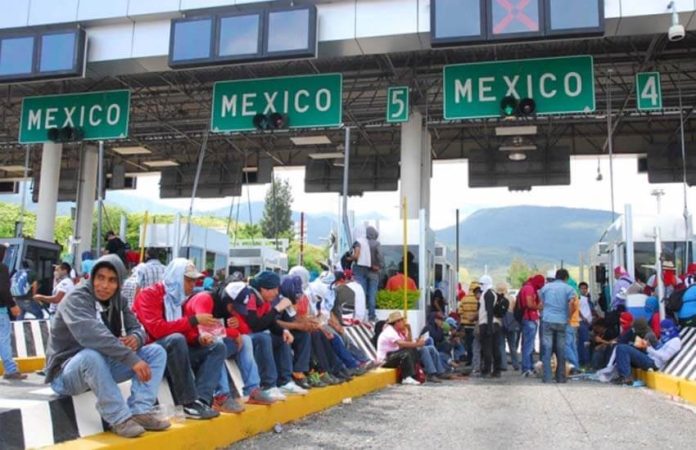If you’ve ever done any long-distance driving in Mexico, you’ve probably discovered that toll roads are the way to go.
They’re nice. They’re paved. They’re usually relatively free of potholes. They also come with insurance coverage in the case of accidents, and the famous “Green Angels” roam up and down in green vehicles to give mechanical and any other kind of assistance people might need.
All in all, it’s a pretty good service, and while I think that all roads should be as nice and as cared for as toll roads, I grudgingly understand the need to charge a fee. Mexico has one of the lowest tax collection rates in the Americas, so the money for maintaining them has to come from somewhere.
And it is quite a bit of money — so much so that toll plazas are frequently the sites of robbery and takeovers. Through a combination of “no justice, no peace”-type protests and a “cheating is cool, paying is for suckers” general philosophy from some — Mexico loses about 1.5 billion pesos in tax revenue a year that would otherwise count as income.
The issue of toll roads is an ongoing struggle between the government — which however corrupt it may be does need to collect taxes to provide the public services that it does — and citizens who don’t think they should have to pay. (In the case of takeovers, the occupiers of the toll plazas apparently think that they should be paid instead.)
Strategies for avoiding the tolls are well-known: motorcyclists simply ride around the boom, and others follow the car ahead of them, getting as close to them as they can and getting through before the boom goes back down. Others push through the booms (which are wisely flexible) or simply get out of their cars and lift them up.
For a short while, the operators of México state’s infamous toll plaza in Ecatepec thought that they had a foolproof way to collect their fees regularly flouted by drivers. As a solution, they installed spikes to rise and pop drivers’ tires whenever they didn’t pay their toll, but people quickly found a way to get around those as well.
And because toll plazas are often out in the middle of nowhere — or at least mostly not in cities — they tend to be fairly easy targets for opportunists and protesters alike. Toll collection workers who accept these jobs know that they need to be ready to be confronted at worst and ignored at best.
As someone who comes from a long line of passive resisters and activists, my first moral instinct when hearing about the takeover of toll booths is to give them the benefit of the doubt, even against my own tendency toward extreme rule-following.
On the one hand, I want everyone to follow the rules because they exist for a reason. On the other, “no justice, no peace,” right? There are a lot of people who have a lot to be mad about in Mexico, so why shouldn’t they seek justice in ways that actually get the attention of the authorities? Lord knows writing letters and standing outside government buildings with a sign doesn’t do the trick.
But when taking over toll plazas becomes a regular gig, and especially when those takeovers turn violent, they get a narrowed side-eye from me.
The students involved in some recent takeovers were from the same school as the missing 43 students in 2014 — the Ayotzinapa teacher training college — and have a history of taking over toll booths and vehicles alike as a form of social protest. They were also recently involved in a clash with the National Guard. When they set a semi-trailer in neutral and aimed it to go barreling toward the soldiers, Acapulco Mayor Abelina López bizarrely defended them, insisting that leniency was warranted because “no one was driving the truck.”
Nor does President López Obrador seem to have a problem with the students’ forms of protest. I suppose that after the disappearances, any protest behavior from students at this school, even when it’s dangerous, is permissible. As long as none of them become journalists and cover the president in a negative light, it’s apparently all OK.
When it comes to simply not wanting to pay, I understand the motivation: keeping your money while maybe sticking it to a corrupt government. One man said that people shouldn’t pay because they were in “extreme poverty,” and I laughed out loud.
People in Mexico living in extreme poverty don’t own cars.
When it comes to takeovers in which the protesters don’t do anything but let drivers through without paying, I suppose I can understand it as a political statement and general subversion. But taking over a toll plaza and then collecting money, especially when it seems to be an established business model that thrives on habit and impunity — like, wow, the protesters who attacked the National Guard had been doing these takeovers predictably twice a week for six years — that’s some cynical stuff right there.
And taking things out on toll booth workers, who after having suffered threats and beatings can’t ever be sure what to expect, is kind of like surprise-punishing a criminal’s kids for the parent’s crimes. Sure, they’re part of the household, but they’re not the puppet masters.
Toll roads are just one of the many areas in which impunity reigns. Until would-be cheaters and opportunists face a real chance of not actually getting away with it, these incidences are bound to continue.
I just hope they keep working enough for the system to continue. Those nice roads and the guarantee that help will find you if you need it aren’t things I want going away.
Sarah DeVries is a writer and translator based in Xalapa, Veracruz. She can be reached through her website, sdevrieswritingandtranslating.com and her Patreon page.
